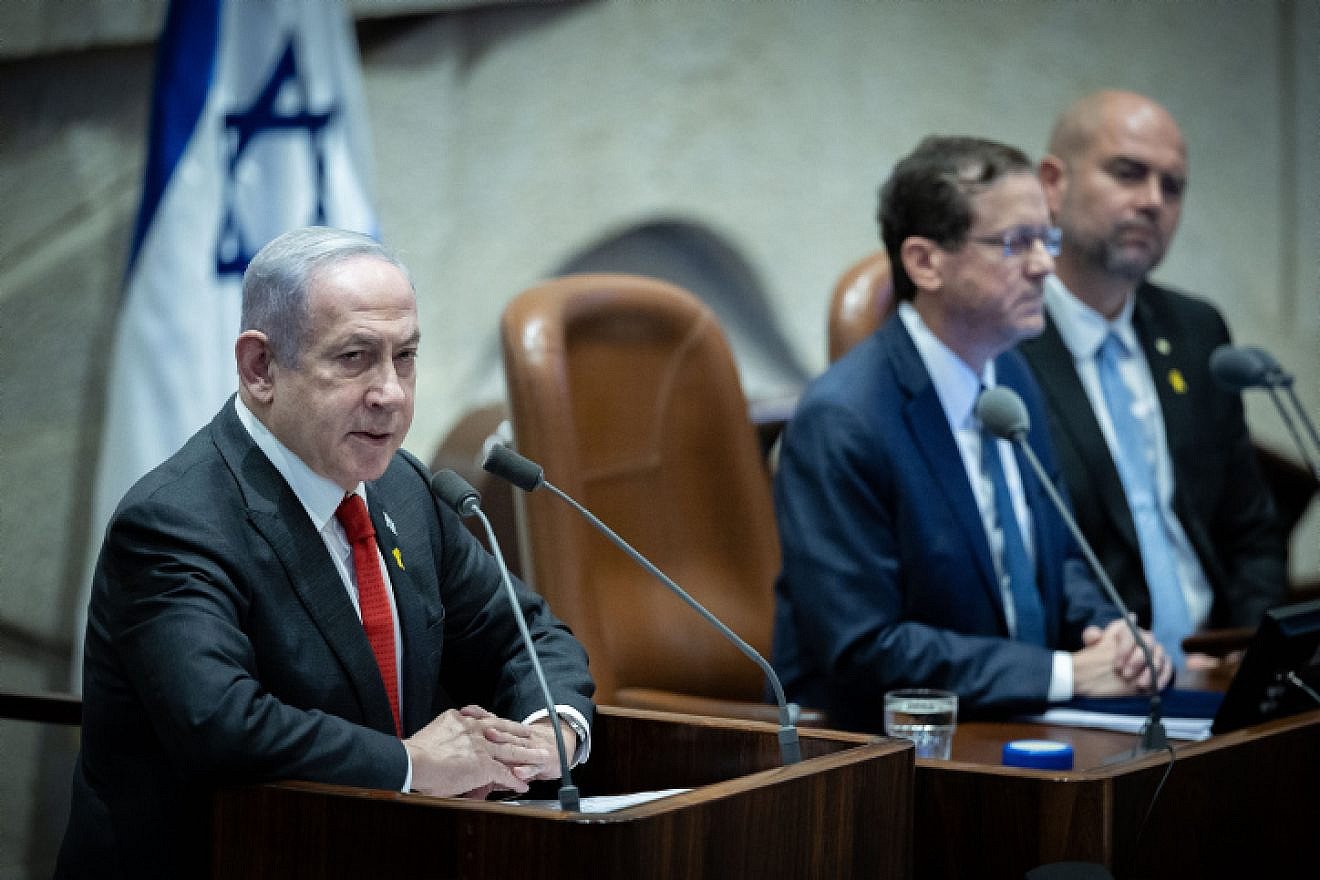Israel began the 75th anniversary of its founding on a somber note as Knesset members stood for a minute of silence in honor of those fallen in battle during a special session of the plenum on Wednesday.
Despite the solemnity, however, the ceremony managed to broadcast a spirit of optimism, even rebirth, as speakers registered determination to defeat Israel’s enemies and forge a new national unity in the wake of the devastation of Oct. 7.
Addressing the plenum, Israeli Prime Minister Benjamin Netanyahu began by expressing the “boundless appreciation” of all Israel’s citizens for the heroism and sacrifice of those fighting in the Gaza Strip.
“We will continue to strive with determination to defeat the cruel enemy that stands in front of us. We will continue to ensure the national revival and, thus, we will fulfill the wishes of our dear sons who are mighty in spirit and action,” he said.
While it is true that Israel suffered a terrible blow on Oct. 7, “Israeli society came together…. This is a war for the home,” he continued.
Israel’s enemies “deluded themselves that Israel is as weak as a spider’s web,” but Israel has proven just how wrong they were, he added.
Describing Hamas as “the new Nazis,” the prime minister said that those who “kidnapped, raped and murdered have brought down upon themselves unprecedented destruction by their own hands.”
Of Israel’s allies, Netanyahu said he has warned them, “You will be next in line. The danger will reach you faster than you think. Our war is yours and our victory is yours.”
Noting that some have expressed the opinion that the events of Oct. 7, or “Black Sabbath” as it’s now called in Israel, brought Israel back to the days of antisemitic pogroms in Eastern Europe, Netanyahu said it was true in one respect.
“The intention of those who seek our lives, to destroy us, has not changed over the years. The hatred is the same hatred. The lust for murder is the same lust for murder,” he said.
But unlike in the past, Jews today have a country and an army, he continued.
“We restored to the people of Israel the protective power that we lost over the generations. In the face of the barbarism that came upon us, we stand like a fortress wall,” said Netanyahu.
“And I would like to add that if indeed we have returned, as it were, to the beginning of Zionism, then the point is to sharpen our understanding that we must shape our destiny with our own hands,” he added.
That means grasping more tightly to the Land of the Patriarchs, restoring the destroyed settlements and kibbutzim and returning their residents to live in security, he said. He called for “a policy of strengthening and strengthening and still more strengthening.”
The prime minister turned to Knesset Speaker Amir Ohana and hinted that legislation would soon reach the parliament that would make the Jewish state stronger than it has ever been.
Ohana, in the ceremony’s opening remarks, quoted from fallen IDF Master Sergeant Elkana Vizel, 24, who was killed in an explosion in Gaza on Monday which claimed the lives of 21 soldiers.
“We have so much to be proud of and be happy about, we are a generation of redemption,” said Ohana, quoting from Vizel’s last letter to his family.
“We are writing the most significant moments in the history of our nation, and of the whole world. So please be optimistic. Keep choosing life all the time. A life of love, hope, purity, and optimism,” Vizel had written.
Israeli President Isaac Herzog also quoted passages written by soldiers who had been killed in battle and their families, focusing on a message of unity.
“I sacrificed my son not so that we would be divided. Wake up. We are all one people,” said Herzog, quoting the father of Asaf Tobul, who fell in Gaza.
Quoting Itzik Azoulai, whose son Yohai was murdered at the music festival in Re’em on Oct. 7, Herzog said, “If the heavy price of losing my son was for the unity of the people, I am ready to accept surrendering him with love.”
Noting that “unity is not uniformity” and expecting that “this House” would soon enough see the return of stormy debates, Herzog nevertheless called for new norms. “There is a way to argue. Even when arguing, be worthy,” he said.
“We cannot allow a return to the discourse of Oct. 6. We cannot talk about a change in the public discourse without this House itself making a change in the discourse,” he added.
“We cannot talk about mutual respect and unity without the Knesset taking a central part in the change. The demand of the people, of the families, of the fallen, must permeate here, must be reflected from here, must become a decree engraved on the walls of this tabernacle. It is our duty towards this people, towards this generation to be worthy,” he said.
The only discordant note during the ceremony came from opposition leader Yair Lapid of the Yesh Atid Party, who said, “What do you have to celebrate now?”
Lapid attacked the political system, the Knesset and the government, descrying them as part of the problem rather than the solution.
“Israel has never been sadder. The sadness sits in the air like a stone,” he said. “People walk around broken, the heart breaks every day anew for the abductees, for the fighters who are killed and for the families.”
However, even the day’s most pessimistic speaker said that Israel would emerge victorious. He said the real victory would not be the death of Hamas leader Yahya Sinwar, but a change in Israeli society so “that we will be better toward each other.”
“We have to make a change. We always knew how to reinvent ourselves, to find the strength within us in the difficult moments—and we’ll find it this time as well,” Lapid said.


























